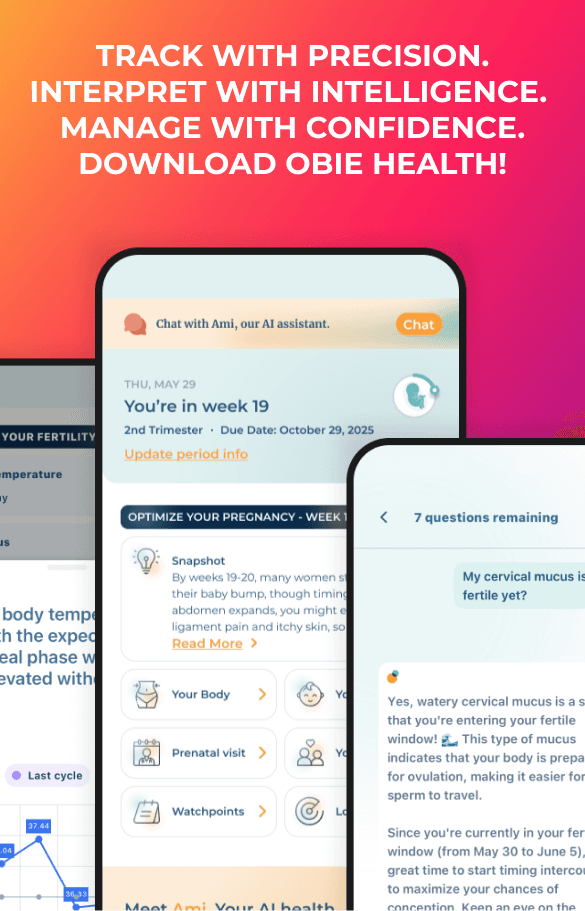Riboflavin is Vital for Both You and Baby
Obie Editorial Team
Even if you have a healthy diet by the usual standards, your doctor will probably recommend that you take a prenatal vitamin when you become pregnant. It’s nothing personal, and he certainly doesn’t doubt that you’re eating your veggies every day. However, even with a nutritious diet, you might be lacking enough of the important vitamins necessary to your baby’s health and development. You’ll be eating for two, so enough iron and calcium for you might not be enough for baby. Prenatal vitamins will also be important so that your body is stocked up and ready for the pregnancy. One important vitamin in both of these diets is riboflavin.
Riboflavin, also known as vitamin B2, is not as commonly understood as other vitamins. Most women understand that calcium is good for the bones and vitamin D is good for eyesight, but riboflavin is not quite as universally understood. It helps your body produce energy and it promotes healthy skin. In pregnancy, women who are already deficient become especially so. If you’re deficient during pregnancy, you’ll have cracked, sore lips that don’t heal with lip balm. You might also become anemic, and preeclampsia will be more likely. You’ll also be putting your growing baby at risk for a deficiency, which is the most important thing you need to avoid. Riboflavin assists in the development of bones, muscles, cells and nerves in babies in utero.
So, it’s important that you add riboflavin to your diet before you become pregnant, but it’s equally important that you continue to consume it as your pregnancy progresses. Most prenatal vitamins contain B2 in the long list of nutrients, but you can also add riboflavin to your diet by eating more dairy, mushrooms, soybeans and spinach. It’s also important to remember that light degrades riboflavin, so buying milk in opaque cartons or keeping foods in dark areas will help preserve the nutrients.
If you’re thinking about getting pregnant in the near future, talk to your doctor about prenatal vitamins and make sure riboflavin is included in the list. A supplement is especially important for women who don’t eat meat or dairy products, but anyone can benefit from the addition of the vitamin to their diet. It’s water soluble, so even if you eat a lot in one day it will be flushed out by the next. When you consume riboflavin, you and your baby will both benefit.
Source: Hilary Powers et al: Riboflavin in Development and Cell Fate. Water Soluble Vitamins Volume 56 pp. 229-245 2012
Riboflavin, also known as vitamin B2, is not as commonly understood as other vitamins. Most women understand that calcium is good for the bones and vitamin D is good for eyesight, but riboflavin is not quite as universally understood. It helps your body produce energy and it promotes healthy skin. In pregnancy, women who are already deficient become especially so. If you’re deficient during pregnancy, you’ll have cracked, sore lips that don’t heal with lip balm. You might also become anemic, and preeclampsia will be more likely. You’ll also be putting your growing baby at risk for a deficiency, which is the most important thing you need to avoid. Riboflavin assists in the development of bones, muscles, cells and nerves in babies in utero.
So, it’s important that you add riboflavin to your diet before you become pregnant, but it’s equally important that you continue to consume it as your pregnancy progresses. Most prenatal vitamins contain B2 in the long list of nutrients, but you can also add riboflavin to your diet by eating more dairy, mushrooms, soybeans and spinach. It’s also important to remember that light degrades riboflavin, so buying milk in opaque cartons or keeping foods in dark areas will help preserve the nutrients.
If you’re thinking about getting pregnant in the near future, talk to your doctor about prenatal vitamins and make sure riboflavin is included in the list. A supplement is especially important for women who don’t eat meat or dairy products, but anyone can benefit from the addition of the vitamin to their diet. It’s water soluble, so even if you eat a lot in one day it will be flushed out by the next. When you consume riboflavin, you and your baby will both benefit.
Source: Hilary Powers et al: Riboflavin in Development and Cell Fate. Water Soluble Vitamins Volume 56 pp. 229-245 2012







